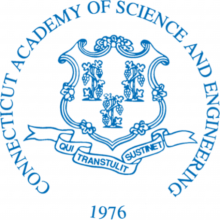Hartford, April 17, 2013 — Nobel Prize-winner Thomas A. Steitz of Yale University will receive the 2013 Connecticut Medal of Science for his ground-breaking work on the structure and function of the ribosome, the protein making factory key to the function of all life. Dr. Steitz is Yale’s Sterling Professor Molecular Biophysics & Biochemistry and Professor of Chemistry, as well as a Howard Hughes Medical Institute Investigator.
The award will be presented at the annual meeting of the Connecticut Academy of Science and Engineering on May 22, 2013 at Quinnipiac University.
Steitz shared the 2009 Nobel Prize in chemistry with Venkatraman Ramakrishnan and Ada Yonath, for the use of X-ray crystallography to map the position for each and every one of the hundreds of thousands of atoms that make up the ribosome. Steitz’ research has focused on the molecular mechanisms by which the proteins and nucleic acids involved in the central dogma of molecular biology carry out gene expression from replication and recombination of the DNA genome, to its transcription into mRNA, followed by the various components associated with the translation of mRNA into protein. Not only are these processes fundamental to all life forms, but many of the macromolecules involved in these processes are known or potential targets for therapeutic drugs.
In 2001, Steitz, along with Susan Froshauer, Yale colleagues Peter Moore and Bill Jorgensen and others, founded New Haven-based Rib-X Pharmaceuticals to apply the research in the creation of new classes of antibiotics to treat multi-drug resistant infections like tuberculosis and E-coli. The company has attracted millions of dollars of investment and sustained a team of 45 full-time employees to date.
Dr. Steitz is also known for his astute mentoring of students and post-doctoral fellows many who have become leaders in their institutions. He has been a member of Yale’s faculty since 1970 and a Howard Hughes Medical Institute Investigator since 1986. A graduate of Lawrence College in Appleton, Wisconsin, Steitz earned his PhD in molecular biology and biochemistry from Harvard. His other awards include the Pfizer prize from the American Chemical Society, the Rosenstiel Award for distinguished work in basic biomedical sciences, the AAAS Newcomb Cleveland Prize, the Keio Medical Science Prize, and the Gairdner International Award. He has been a member of the National Academy of Sciences since 1990 and the Connecticut Academy of Science and Engineering since 1991.
The Connecticut Medal of Science is the state’s highest honor for technological achievement in fields crucial to Connecticut’s economic competiveness. Modeled after the National Medal of Science, this award is made by the Connecticut Office of Higher Education, with the assistance of the Connecticut Academy of Science and Engineering, in alternate years with the Connecticut Medal of Technology.
###

